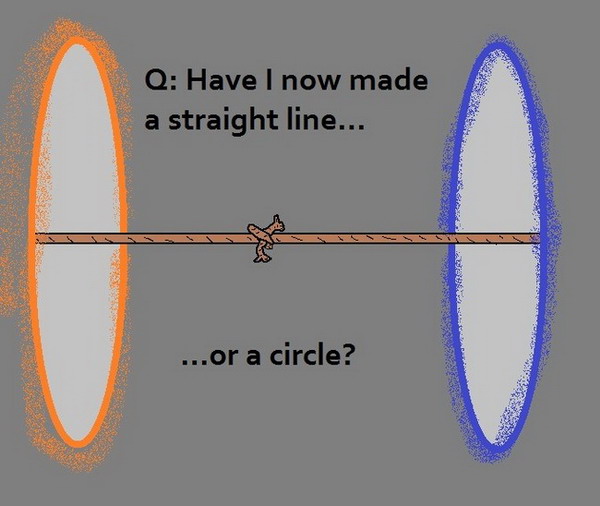Ever[/b]]Blue Eyes:
The Hardest Logic Puzzle in the World
A group of people with assorted eye colors live on an island. They are all perfect logicians -- if a conclusion can be logically deduced, they will do it instantly. No one knows the color of their eyes. Every night at midnight, a ferry stops at the island. Any islanders who have figured out the color of their own eyes then leave the island, and the rest stay. Everyone can see everyone else at all times and keeps a count of the number of people they see with each eye color (excluding themselves), but they cannot otherwise communicate. Everyone on the island knows all the rules in this paragraph.
On this island there are 100 blue-eyed people, 100 brown-eyed people, and the Guru (she happens to have green eyes). So any given blue-eyed person can see 100 people with brown eyes and 99 people with blue eyes (and one with green), but that does not tell him his own eye color; as far as he knows the totals could be 101 brown and 99 blue. Or 100 brown, 99 blue, and he could have red eyes.
The Guru is allowed to speak once (let's say at noon), on one day in all their endless years on the island. Standing before the islanders, she says the following:
"I can see someone who has blue eyes."
Who leaves the island, and on what night?
There are no mirrors or reflecting surfaces, nothing dumb. It is not a trick question, and the answer is logical. It doesn't depend on tricky wording or anyone lying or guessing, and it doesn't involve people doing something silly like creating a sign language or doing genetics. The Guru is not making eye contact with anyone in particular; she's simply saying "I count at least one blue-eyed person on this island who isn't me."
And lastly, the answer is not "no one leaves."
I've done my best to make the wording as precise and unambiguious as possible (after working through the explanation with many people), but if you're confused about anything, please let me know. A word of warning: The answer is not simple. This is an exercise in serious logic, not a lateral thinking riddle. There is not a quick-and-easy answer, and really understanding it takes some effort.
The Hardest Logic Puzzle in the World
A group of people with assorted eye colors live on an island. They are all perfect logicians -- if a conclusion can be logically deduced, they will do it instantly. No one knows the color of their eyes. Every night at midnight, a ferry stops at the island. Any islanders who have figured out the color of their own eyes then leave the island, and the rest stay. Everyone can see everyone else at all times and keeps a count of the number of people they see with each eye color (excluding themselves), but they cannot otherwise communicate. Everyone on the island knows all the rules in this paragraph.
On this island there are 100 blue-eyed people, 100 brown-eyed people, and the Guru (she happens to have green eyes). So any given blue-eyed person can see 100 people with brown eyes and 99 people with blue eyes (and one with green), but that does not tell him his own eye color; as far as he knows the totals could be 101 brown and 99 blue. Or 100 brown, 99 blue, and he could have red eyes.
The Guru is allowed to speak once (let's say at noon), on one day in all their endless years on the island. Standing before the islanders, she says the following:
"I can see someone who has blue eyes."
Who leaves the island, and on what night?
There are no mirrors or reflecting surfaces, nothing dumb. It is not a trick question, and the answer is logical. It doesn't depend on tricky wording or anyone lying or guessing, and it doesn't involve people doing something silly like creating a sign language or doing genetics. The Guru is not making eye contact with anyone in particular; she's simply saying "I count at least one blue-eyed person on this island who isn't me."
And lastly, the answer is not "no one leaves."
I've done my best to make the wording as precise and unambiguious as possible (after working through the explanation with many people), but if you're confused about anything, please let me know. A word of warning: The answer is not simple. This is an exercise in serious logic, not a lateral thinking riddle. There is not a quick-and-easy answer, and really understanding it takes some effort.
Nicked this from my avatar, not strictly on topic I know but its on the general theme, if anyone can answer it without looking up the answer I will be incredibly impressed.
Also I've always loved the Euripides paradox, mainly cos I was thinking one day, came to the same conclusions myself, and only discovered it was actually a 'thing' many years later.

